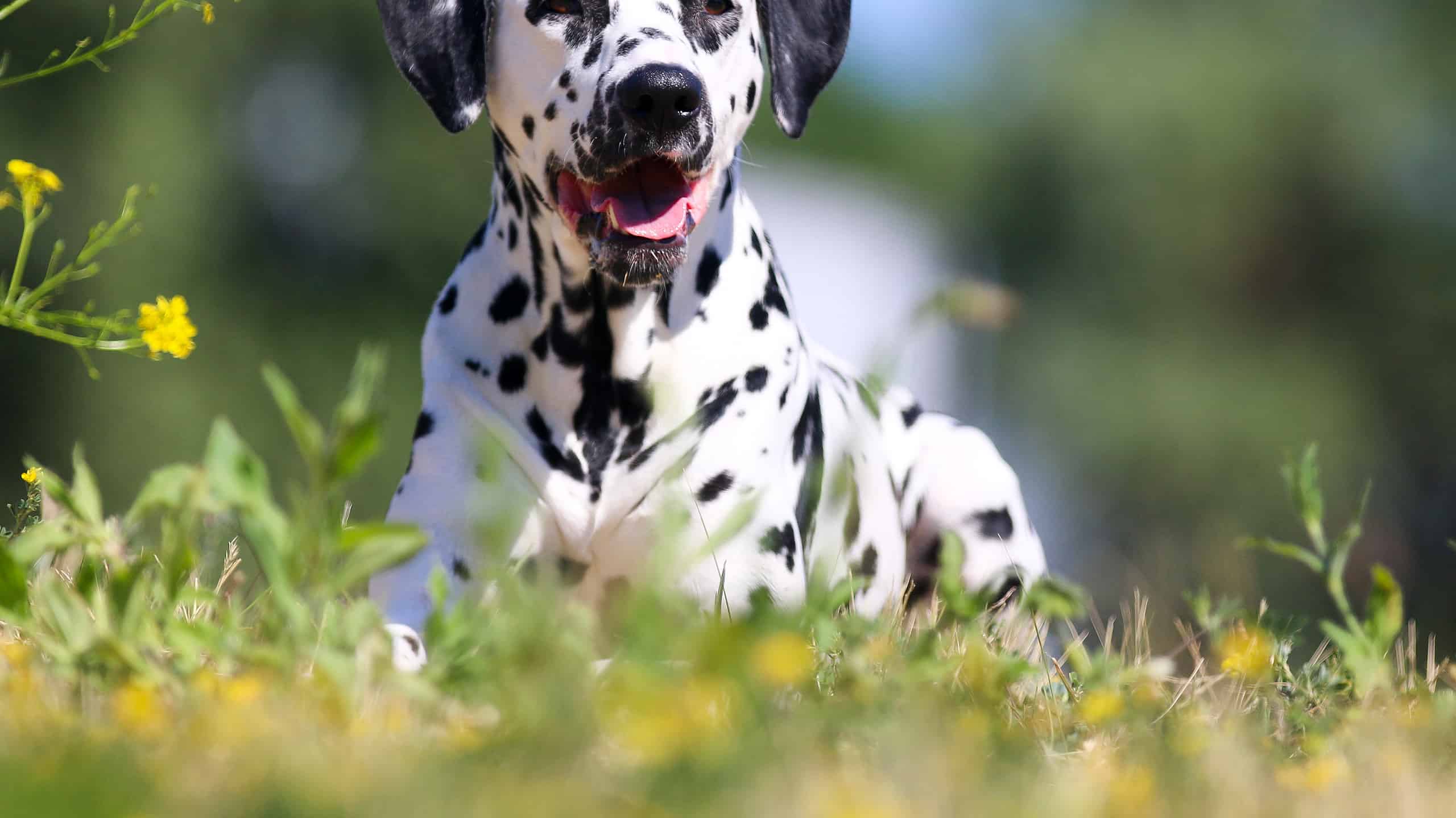Dalmatians are loving, loyal dogs that will shower you with affection for many years. But they can be prone to health problems. In this article, you’ll discover ways to prevent common health problems and the signs to look out for in your dalmatian.
What’s the Life Expectancy of Dalmatian?
On average, the life expectancy of a Dalmatian is anywhere from 10 to 14 years old. While your Dalmatian’s life expectancy can be hard to predict, many factors can influence it. These include factors such as genes, diet, and lifestyle.

On average, the life expectancy of a Dalmatian is anywhere from 10 to 14 years old.
©Eric Isselee/Shutterstock.com
Are Dalmatians Prone to Health Issues?
While Dalmatians have a long life expectancy, they are prone to health issues that can stump their vitality. In the following sections, you’ll learn about these health issues in further detail.
Are Dalmatians High Maintenance?
Dalmatians are a high-maintenance breed. Moreover, this is due to their excessive levels of energy and being prone to bladder issues. Before adding a Dalmation, you must consider if you have the time of day to keep them at their optimum level of health.
Do Dalmatians Have Behavioral Issues?
Many Dalmatians can be prone to behavioral issues, which can affect their health. On the other hand, this can be preventable if they are socialized properly. Without proper socialization, they are prone to separation anxiety, aggression, and even depression.

Many Dalmatians can be prone to behavioral issues which can affect their health.
©iStock.com/Eudyptula
Why Are Dalmatians a Difficult Breed?
Dalmatians are high-energy pups that do not do well in small living quarters. For example, if you live in a complex or small apartment, it would not be advised to keep a Dalmatian. They may become bored and destroy the apartment or attack the mailman if they drop your items off at your apartment.
Dalmatian Origin
To better understand the health issues that your Dalmatian is prone to, it is important to learn the history of the Dalmatian.
Spotted dogs began biting their way into history beginning in 3700 B.C. One of the first spotted dogs was a companion to the Egyptian Pharaoh Cheops. Following 2,000 years after that, the Greeks illustrated using a spotted dog to run after a pig.
It wasn’t until the 16th century that Englishmen began taking these loved spotted canines with them.
The Dalmatian’s smooth and muscular build made them perfect for working with carriages. Due to their endless supply of energy, these pups stopped at nothing to protect the horses, people, and carriage from strangers.
Soon after, carriages began to be used with firemen to aid in carrying their water pumps. What’s more, is that they began to use Dalmatians to move people out of the way, and alert them that a fireman was on the move.
Dalmatians in the present time are used as companions and also to aid firefighters. It’s not a mystery how that came to be due to their uses in past centuries.

Dalmatians in the present time are used as companions and also to aid firefighters.
©Dora Zett/Shutterstock.com
Common Dalmatian Health Problems
In the following paragraphs, we’ll go over 5 common Dalmatian health issues, symptoms, and treatment.
1. Bladder Stones
Bladder stones are hard, calcium deposits that develop in the bladder. These pesky stones can cause serious health issues if they are not taken care of.
Symptoms
- Excessive urination.
- Unable to pee.
- Blood in urine.
Treatment
- If the stone is small enough, your dog may be able to pass it on their own.
- Your vet may perform a surgery in which a catheter is inserted, and they rinse out the stone.
- Switching to a high protein diet, as directed by the vet.
2. Deafness
Deafness can be onset, genetic, or ongoing. If it is sudden, your vet can test to see if the deafness is coming from the middle ear canal. An inner ear infection can cause deafness. Your vet can prescribe a local antibiotic. However, if no infection is found, your vet may not be able to treat deafness.
Symptoms
- Sudden change in listening, or behavior.
- Lack of response to doorbells, alarms, and other sounds that would otherwise bother them.
- Doesn’t answer to their name being called.
- Doesn’t respond to normal commands.
- Changes in behavior caused by insomnia.
- Barking more than normal.
- Appearing to be less energetic.
Treatment
- Training to help your dog adjust to a new lifestyle without sound.
- Learning sign language to use with your dog instead of audible communication.
3. Dilated Cardiomyopathy
Dilated cardiomyopathy is another common health problem in Dalmatians that, if left untreated, can be fatal. It is a condition in which your canine’s heart is enlarged. With this condition, the heart becomes thin and weak. If you suspect your Dalmatian has this condition, please rush them to the vet immediately.
Symptoms
- Quick breathing while resting.
- Struggling to breathe.
- Coughing.
- Lethargic.
- Fainting.
- Exhaustion.
- Inflamed stomach.
- Sudden death.
Treatment
- A mixture of prescriptions that lower blood pressure improves heart health and release fluids surrounding the heart.
- Typically, a specialized diet will be also issued by your veterinarian to aid in improving heart health.
4. Dalmatian Bronzing Syndrome
Dalmatian bronzing syndrome may sound like a fancy cosmetic brand or luxury jewelry. However, it is not as lavish as it might sound. This condition is a skin infection where your dog’s skin will turn a pink or copperish color, hence the “bronze” reference.
Symptoms
- Loss of fur.
- Bumps surrounding the hair follicles.
- Crusty scabs.
- Scaly skin.
- Itching skin.
- Splotches on fur.
- Bronze tinge.
Treatment
The treatment of Dalmatian bronzing syndrome can be difficult to treat. This is because there may be environmental causes or digestive issues such as autoimmune diseases. Therefore, each Dalmatian bronzing syndrome case can have a different mix of treatments. Treatments include a mix of medicated shampoos and creams.
5. Laryngeal Paralysis
Another common health issue in Dalmatians is a condition called laryngeal paralysis. This condition gradually increases difficulty in breathing if left untreated.
Symptoms
- Raspy breathing.
- Panting.
- Coughing.
- Dry heaving.
- Regurgitating.
- Intolerance to warmth, and exercise.
- Barking that changes its sound.
- Trouble catching breath.
- Bluish tinge to teeth, and gums.
- Fainting.
Treatment
Once your canine has been diagnosed with laryngeal paralysis, there is no cure. But there are ways to help manage this condition and its symptoms, such as:
- Stress relief.
- Anxiety prescription.
- Restricting exposure to hot weather, and exercise.
- Using harnesses instead of collars.
- Physical therapy.
- Changing to a different diet.

Restricting exposure to hot weather, and exercise can help relieve laryngeal paralysis symptoms in Dalmatians.
©iStock.com/Eudyptula
How to Prevent Dalmatian Health Problems
It is important to remember that even though genes can be the culprit of many health issues, you play a vital role as the pet parent. Here are 5 tips to help you prevent Dalmatian health issues.
1. Choose a Professional Breeder
When choosing a breeder, do not go for the backyard breeder route. They lack the knowledge and professionalism that comes with keeping their Dalmatians healthy. On the other hand, choosing a highly reputable breeder will help you reduce the chances of your dog developing a health issue later in life. Professional breeders can also provide a purebred puppy, health tests, and all the essential vaccines to help your dog later in life.
2. Use a Healthy Dog Food
Be sure to look for ingredients that are recognizable and readable. This reduces your chances of exposing your dog to fillers and prevents health complications from popping up later in life.
3. Provide Plenty of Exercise
Dalmatians are high-energy dogs. Due to their large amounts of energy and muscular physique, they require being with a very active family. Be sure to take them on multiple walks and hikes to keep them in top shape.
4. Don’t Skimp on Exams
Annual wellness exams are very important to monitor and check your dog’s health. Plus, it is important to keep their vaccines up to date to help prevent illness and disease.
5. Don’t Overdo it With Treats
No dog benefits from being overfed treats. Dalmatians are especially vulnerable to dental issues, breathing issues, and other issues when they feed processed treats. Only feed them healthy treats such as cooked chicken breast without seasoning, blueberries, and dog-safe veggies.

Dalmatians are especially vulnerable to dental issues, breathing issues, and other issues when they feed processed treats.
©Eric Isselee/Shutterstock.com
Recap: Dalmatian Common Health Conditions
Your Dalmatian may be susceptible to these 5 common health problems. Yet, with an appropriate diet, exercise, and yearly checkups, you can help prevent their chances of disease.
| Condition | Symptoms | Treatment |
| Bladder Stone | Unable to pee, blood in urine, frequent urinating. | High protein diet, catheter surgery, change in diet. |
| Deafness | Trouble responding to vocal commands, trouble sleeping, frequent barking. | Sign language class, lifestyle changes in which the pup must learn visual cues instead of verbal cues. |
| Dilated Cardiomypathy | Lethargy, fainting, exhaustion. | Medication, and diet modifications as prescribed by your veterinarian to improve cardiac health. |
| Dalmatian Bronzing Syndrome | Itching, scabs, bronze tinge to fur. | Prescription-strength shampoos, and creams to kill off the infection. |
| Laryngeal Paralysis | Raspy breathing, trouble catching breath, weakness. | There is no single cure. On the contrary, being able to manage the condition through diet, anxiety meds, and stress relief can reduce symptoms drastically. |
Ready to discover the top 10 cutest dog breeds in the entire world?
How about the fastest dogs, the largest dogs and those that are -- quite frankly -- just the kindest dogs on the planet? Each day, AZ Animals sends out lists just like this to our thousands of email subscribers. And the best part? It's FREE. Join today by entering your email below.
Thank you for reading! Have some feedback for us? Contact the AZ Animals editorial team.








